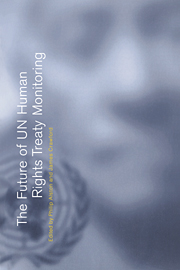Book contents
- Frontmatter
- Contents
- List of Tables, Figure, Appendices
- Notes on Contributors
- Editors' Preface
- Table of Treaties
- Table of Cases
- List of Abbreviations
- 1 The UN human rights treaty system: A system in crisis?
- A The UN human rights monitoring system in action
- B National influences and responses
- 9 Making human rights treaty obligations a reality: Working with new actors and partners
- 10 Domestic implementation of international human rights treaties: Nordic and Baltic experiences
- 11 The domestic impact of international human rights standards: The Japanese experience
- 12 The role of human rights treaty standards in domestic law: The Southern African experience
- 13 Uses and abuses of the treaty reporting procedure: Hong Kong between two systems
- 14 The United States and the international human rights treaty system: For export only?
- C Regional and sectoral comparisons
- D Common challenges for the treaty bodies
- E Looking to the future
- Index
13 - Uses and abuses of the treaty reporting procedure: Hong Kong between two systems
Published online by Cambridge University Press: 23 December 2009
- Frontmatter
- Contents
- List of Tables, Figure, Appendices
- Notes on Contributors
- Editors' Preface
- Table of Treaties
- Table of Cases
- List of Abbreviations
- 1 The UN human rights treaty system: A system in crisis?
- A The UN human rights monitoring system in action
- B National influences and responses
- 9 Making human rights treaty obligations a reality: Working with new actors and partners
- 10 Domestic implementation of international human rights treaties: Nordic and Baltic experiences
- 11 The domestic impact of international human rights standards: The Japanese experience
- 12 The role of human rights treaty standards in domestic law: The Southern African experience
- 13 Uses and abuses of the treaty reporting procedure: Hong Kong between two systems
- 14 The United States and the international human rights treaty system: For export only?
- C Regional and sectoral comparisons
- D Common challenges for the treaty bodies
- E Looking to the future
- Index
Summary
The [third periodic report under the International Covenant on Civil and Political Rights (ICCPR)] was only drawn to the attention of the public when a visiting member of Amnesty International told the local media of its existence in August 1988.
The tendency [on the part of non-govermental organisations (NGOs)], rather, has been to zero in on two or three issues to the exclusion of all else, and then for all the NGOs to do the same thing. So the result – and it was especially marked, I think, at the examination of the third periodic report of the United Kingdom – was that the United Kingdom was deluged with questions relating to Hong Kong and to the Northern Ireland terrorist provisions. Now the selection of one or two important issues, no matter how important … precludes a well-informed across-the-board examination. Important issues receive no attention.
Introduction
As a dependent territory of the United Kingdom until its return to the People's Republic of China on 1 July 1997, Hong Kong benefited from the United Kingdom's participation in the six major United Nations human rights treaties, the implementation of which is subject to monitoring by committees of independent experts. While the United Kingdom did not always extend the treaties to Hong Kong at the same time as it ratified them in respect of its metropolitan territory, by the end of 1996 it had extended all six of the treaties to Hong Kong.
- Type
- Chapter
- Information
- The Future of UN Human Rights Treaty Monitoring , pp. 287 - 316Publisher: Cambridge University PressPrint publication year: 2000
- 4
- Cited by



